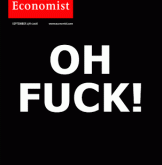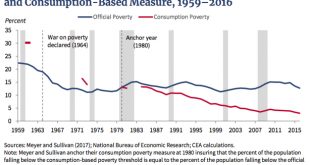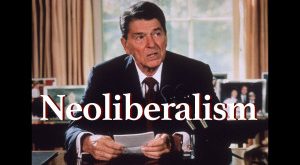In October 2015 I wrote a post in which I compared Bitcoin with Yap island stone money. Farfetched? No. Today, Sciencenews published an article by Bruce Bower. He states that archeologists nowadays argue the same thing. An excerpt: Archaeologist Scott Fitzpatrick and finance professor Stephen McKeon, both of the University of Oregon in Eugene, see parallels between the public, decentralized way in which rai limestone money on the island of Yap was valued and distributed and the modern-day...
Read More »Why Trump’s tariffs are nearly as unpopular with his voters as Obama’s trade policy was
from Dean Baker Donald Trump made his opposition to much of America’s international trade policy a central theme in his presidential campaign, and his position almost certainly played a major role in his victory in key industrial states like Michigan, Ohio, and Pennsylvania. But the public now seems largely opposed to his recent tariffs against our major trading partners. It is possible to make sense of these seemingly contradictory facts. First, most people are not policy wonks. They...
Read More »Quotes critical of economics
from Asad Zaman This is an assorted collection of quotes I have found useful from time to time in different contexts. I am putting them all together for my own reference, as well as for the benefit of others who may find them similarly useful to make points. JM Keynes Quotes (mostly from General Theory GT): The composition of this book has been for the author a long struggle of escape, and so must the reading of it be for most readers if the author’s assault upon them is to be...
Read More »Divine belief in Economics at the beginning of the 21st century
from Emil Urhammer Drinking the strength of life from men doomed to die, spitting the crimson blood on all the lands of gods; black becomes the sun in summers to follow, weather spells disaster – Need you know more? With this stanza, I begin my story of the divine belief in Economics at the beginning of the 21st century, when this faith was practised and reached the height of its glory. . . . The disastrous climate changes that truly came into effect in the second half of the 21st...
Read More »Pledging fealty to Trump: Europe pays the price for increasing inequality
from Dean Baker At the NATO summit earlier this month, Jens Stoltenberg, the secretary general of NATO, was forced to publicly praise Donald Trump’s leadership. Mr. Stoltenberg is almost certainly a very intelligent hardworking man. That is virtually a prerequisite for a person in his position. By contrast, Donald Trump is the most ignorant ill-prepared person ever to sit in the White House. Nonetheless, when Stoltenberg noted the increases in military spending by NATO members, Trump...
Read More »Where modern macroeconomics went wrong
from Lars Syll In issue 1-2 (2018) of Oxford Review of Economic Policy, the editors have invited some well-known contemporary mainstream macroeconomists (including e.g. Simon Wren-Lewis, Randall Wright, Olivier Blanchard, Ricardo Reis, Joseph Stiglitz) to give their views on how to rebuild macroeconomic theory for the future. Some of the contributions are interesting to read. Others — like Wren-Lewis and Blanchard — seem to think that we can basically just go on with our microfounded DSGE...
Read More »Disappearing poverty
from David Ruccio In international human rights law, a “forced disappearance” occurs when a person is secretly abducted or imprisoned by a state or political organization (or by a third party with the authorization, support, or acquiescence of a state or political organization), followed by a refusal to acknowledge the person’s fate and whereabouts, with the intent of placing the victim outside the protection of the law. The most infamous forced disappearances have occurred in Spain...
Read More »On global capitalism and the survival of democracy
from Maria Alejandra Madi In the new millennium, the proliferation of financial assets, with unstable economic growth, has given way to widespread precarious jobs, income gaps and weaker welfare programs. The same policies that have obliterated social services and kept labour cheap have supported the expansion of short-termism and new global business models in the context of deregulated capitalism. Besides, the onset of the 21st century represents a new political age overwhelmed by the...
Read More »Mainstream economics and neoliberalism — what is the difference?
from Lars Syll Oxford professor Simon Wren-Lewis had a post up some time ago commenting on traction gaining ‘attacks on mainstream economics’: One frequent accusation … often repeated by heterodox economists, is that mainstream economics and neoliberal ideas are inextricably linked. Of course economics is used to support neoliberalism. Yet I find mainstream economics full of ideas and analysis that permits a wide ranging and deep critique of these same positions. The idea that the two...
Read More »The Invisible Hand
from Asad Zaman This post is a continuation of ET1%: Blindfolds Created by Economic Theory, We show how the Invisible Hand theory appears to be neutral but actually favors the top 1%. As quoted and refuted in my earlier post on “Failures of the Invisible Hand“, Mankiw writes that: “The reason for excellent functioning of decentralized market economies is that all participants are motivated by self-interest. This self-interest works better than love and kindness in terms of promoting...
Read More » Real-World Economics Review
Real-World Economics Review



